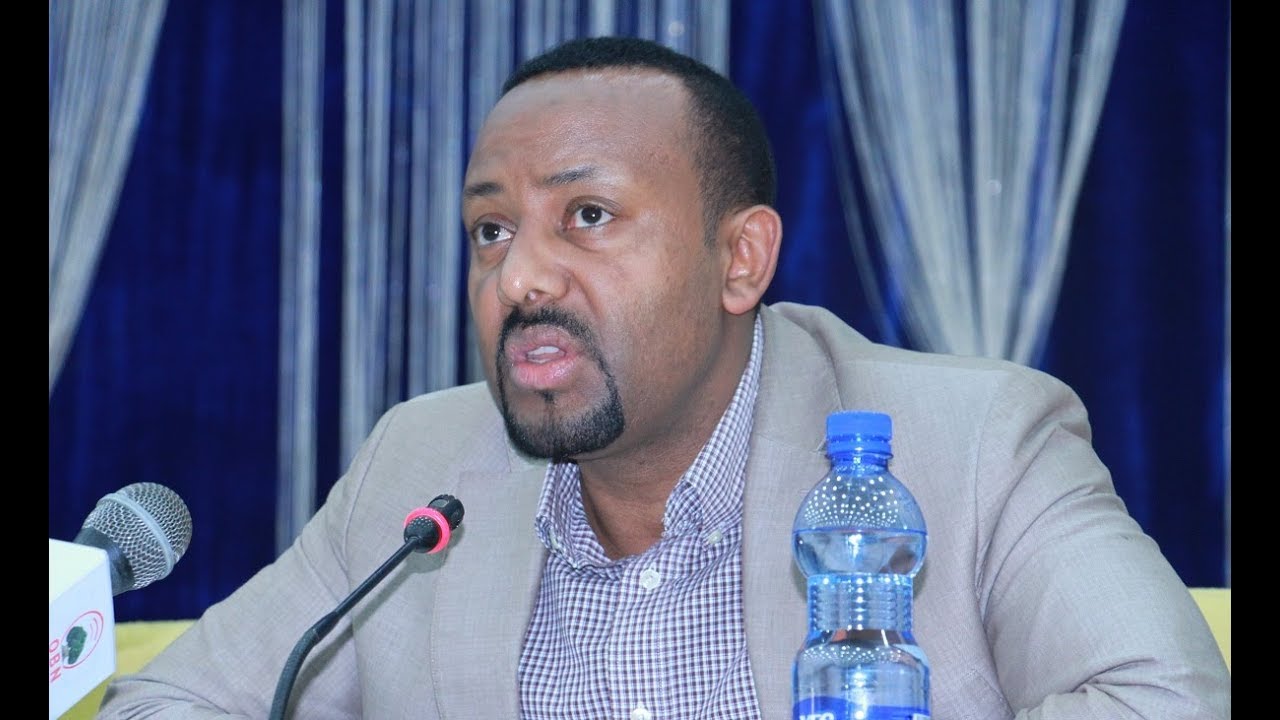We in the Solidarity Movement for a New Ethiopia (SMNE) would like to congratulate Dr. Abiye Ahmed Ali, the newly elected become Prime Minister of Ethiopia.
We also congratulate the people of Ethiopia who have a new opportunity to shape their future for the betterment of all. This is a time for wisdom, diligence, strength and restraint so it is not wasted.
Countless Ethiopians have contributed to this favorable moment, giving us hope for a better future. We must thank them. Others had fought for change in the past.
In our present struggle, many Ethiopians were wounded, imprisoned, tortured, sacrificed their lives or had to flee the country, simply for standing up for greater freedom and justice. These people were from every region of the country, from every walk of life, and of different ages, religions, genders and cultural backgrounds. Among them are Ethiopia’s finest voices for freedom, activists for justice, political leaders, journalists, religious leaders, elders and particularly our youth. Unfortunately, the valiant efforts of the past have not yet produced the fruit for which we still hope.
Our struggle continues today against the lack of justice, freedom, rights and opportunity. The projected image of the country does not match the reality and must be challenged with truth. Powerful gatekeepers block economic participation based on ethnicity.
Laws meant to stifle freedom continue, like the Anti-Terrorism Law and the Charities and Societies Proclamation (CSO). Despite claims of a booming economy we are in the midst of a serious cash flow problem in the country. Hunger levels are high in many places. Corruption is rampant and regime force is still taking the lives of our civilians.
We are better than this; however, today we see a glimmer of hope that things could get better. Sadly, many of the valiant forerunners who fought for this day, are no longer here with us. We should never forget them for they left us a legacy that remains with us today.
Now, a new and promising leader, Dr. Abiye Ahmed, has entered the scene. He is someone who has broken across ethnic lines to see the larger picture of our shared humanity; however, he has come into this leadership position at a challenging time of uncertainty, not only for the EPRDF, but for all of us.
Ethiopia is at a very critical point, which many fear could lead to an explosion of ethnic-based violence and to the disintegration of our country into a failed state. This must be averted, but cannot only be the work of one leader and a few around him, but will require our whole nation to take responsibility. Every sector of society has to do its share, including many in the Diaspora.
We Ethiopians already seem to know that the problems before us must be solved by us, not by outsiders. We are the ones that created it and now we are the ones responsible to collectively steer the country into a better place. It will require humility, thinking beyond ethnicity or other differences and goals that are bigger and greater than ourselves.
We need a new paradigm, meaning we must uproot our habit of advancing our own ethnic-based politics or some other replica of the same. We have to come out from this. It will not work. Ethiopia is for ALL of us; and, if the name offends, it is only because the name has been misused for so long.
Let us bring a new and more positive meaning to it. Yet, the TPLF emblem on the plain Ethiopian flag is meant to provoke rather than focusing on the bigger issues that will lead to greater harmony. Let us work together in these days as many are already doing and should be commended for it. This includes our youth, like the Fano and Qeero, who have maintained the course for nearly three years.They, along with others, should continue to help bring democratic change to everyone— it is their future.
Former Prime Minister Hailemariam Desalegn also deserves credit for what appears to have been a deliberate attempt to advance the prospects for democratic reforms by stepping down from his position.
Obo Lemma Megerssa is among other excellent Ethiopian leaders who forthrightly called for a rejection of the nations and nationalities driven structure and policies of the EPRDF’s ethnic-based federalism, a model that has failed. This “experiment” of ethnic federalism has not achieved the objectives it claimed would be accomplished— greater representation and independence of each nation and nationality— but instead, actually produced the opposite result— the domination by one minority, the TPLF, over all others and increased division, distrust, conflict and hostility among diverse groups, sometimes incited by the TPLF.
This ethnic-based model even created conflicts and isolation within families, communities and regions of mixed ethnicity as it grew into such a hot social issue that it provoked new anger and hostility, even over age-old grievances. Loyalty to tribe or ethnicity was given a higher value than what was right or wrong, suffocating the life out of efforts to work together; yet, making the powerful thrive while the majority struggled to survive.
Lemma is an example of someone who broke the barrier of “tribalism gone wrong” by speaking about the nation as a whole—including others outside his ethnicity. He inspired many by declaring: “ethnicity has no human soul.” This one statement speaks a huge message regarding the primary importance of what makes us human— that every human being is created in the image of God with an individual soul. He and Oromo elders reached out to Amhara leaders and elders by meeting with them in the Amhara region, living out his beliefs.
Some other seeds of unity were planted during the first protests in the Amhara region in late 2015, following the killing of so many Oromo youth. After a religious service in the Amhara region, an Ethiopian Orthodox priest had faced security forces after speaking out at this religious gathering regarding the shared blood between the two groups. It was also declared by Amhara youth who bravely stated, “Oromo blood is our blood, their suffering is our suffering and their pain is our pain.” A Muslim leader said the same at the Ethiopian Soccer tournament in 2016.
Many others are doing their share to cross lines of ethnicity, like the soccer teams from the Amhara youth, welcoming the Oromo to their matches. Even musicians like Teddy Afro and others of differing backgrounds are using their voices, lyrics and talents as bridges of reconciliation and affirmation of one another.
The momentum of this movement has brought a new and stronger voice to the public square— the voice of conviction. Consider the recent vote to approve the State of Emergency in the Ethiopian Parliament. It only passed because it was rigged, while an unprecedented number of members either boycotted the vote, abstained from it or voted against it.
Now with this recent election of Dr. Abiye Ahmed, the TPLF failed in their attempt to control the vote, only agreeing to “give” the vote to Abiye if he agreed to become a puppet, with no control of the military. When he refused, the TPLF endeavored to turn the vote, but it did not work. Instead, other coalition members crossed ethnicities and voted for the candidate they believed would bring change— Abiye Ahmed. All of these we mention, but there are many more, some seen and others unseen, supported by the prayers of the people. We must appreciate and thank them for their efforts, but also know that these glimmers of hope can encourage and uplift others to do the same.
We must not fail to even appreciate the EPRDF for releasing so many prisoners, even despite the implementation of a State of Emergency, which never met the criteria of the law.
We also should recognize the current dilemma of the TPLF and give them acknowledgement for what appears to be restraint. Allegedly, they were strongly opposed to the election of Abiye for chairperson of the EPRDF and the position as prime minister that it entitles him to assume. They could have used the power of the gun to overturn the results, followed by a decision to take absolute military control of the power, but they did not and reluctantly accepted the outcome. They should be commended for this even if we disagree with them on other matters.
Finally, the future of our beloved country of Ethiopia is in the hands of all of us from every ethnic and religious groups. Each of us has to do our share. As for us in the SMNE, we commit to doing ours. This is why we are giving our stance on the situation, even if some disagree with us.
From the beginning, the SMNE was formed on the basis that a better and more just, united and strong Ethiopia could only be formed through actually “talking to each other rather than about each other,” in order to start humanizing our family of Ethiopians. This means implementing a plan for an inclusive national dialogue, national reconciliation (also utilizing our faith-based leaders), and restorative justice.
The Ethiopia that we seek to build for our future should be based on God-given principles where the humanity, freedom and rights of all our people are valued and respected— for no one is free until all are free. This is what we stand for and hope for in the coming days, months and years although it will not be easy. We in the SMNE believe that Dr. Abiye has demonstrated the kind of worldview that can further these principles; however, as mentioned before, a new Ethiopia is the job for all of us.
Once Abiye Ahmed swears as a new Prime Minster and appoints his cabinet, we call for immediate action on lifting the State of Emergency and releasing all political prisoners. This would be followed by holding a national dialogue with all stakeholders, national reconciliation, and democratic reforms, including the repeal of laws like the Anti-Terrorism law, the Charities and Societies Proclamation, and the repressive press and media laws, all of which would strengthen our institutions. A longer term goal would be to work towards establishing the foundation for a free and fair election where all parties can compete for office.
This new prime minister comes as a result of pressure from the people; now he has to advance the heart and desire of the people for freedom and justice.
May God help him, those in positions of influence and all of us in the days and months ahead, helping us to see the humanity of others and holding firm to the truth.







